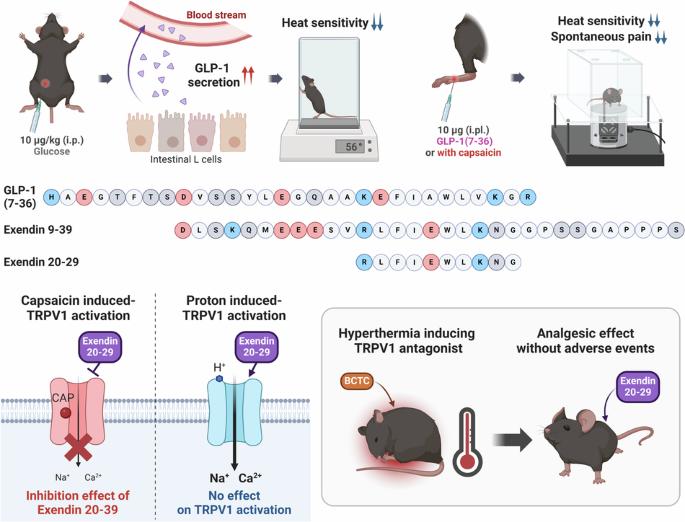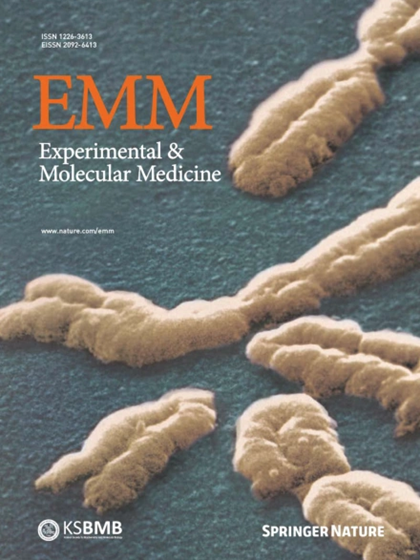GLP-1 and its derived peptides mediate pain relief through direct TRPV1 inhibition without affecting thermoregulation
IF 9.5
2区 医学
Q1 BIOCHEMISTRY & MOLECULAR BIOLOGY
引用次数: 0
Abstract
Hormonal regulation during food ingestion and its association with pain prompted the investigation of the impact of glucagon-like peptide-1 (GLP-1) on transient receptor potential vanilloid 1 (TRPV1). Both endogenous and synthetic GLP-1, as well as a GLP-1R antagonist, exendin 9–39, reduced heat sensitivity in naïve mice. GLP-1-derived peptides (liraglutide, exendin-4, and exendin 9–39) effectively inhibited capsaicin (CAP)-induced currents and calcium responses in cultured sensory neurons and TRPV1-expressing cell lines. Notably, exendin 9–39 alleviated CAP-induced acute pain, as well as chronic pain induced by complete Freund’s adjuvant (CFA) and spared nerve injury (SNI), in mice without causing hyperthermia associated with other TRPV1 inhibitors. Electrophysiological analyses revealed that exendin 9–39 binds to the extracellular side of TRPV1, functioning as a noncompetitive inhibitor of CAP. Exendin 9–39 did not affect proton-induced TRPV1 activation, suggesting its selective antagonism. Among the exendin 9–39 fragments, exendin 20–29 specifically binds to TRPV1, alleviating pain in both acute and chronic pain models without interfering with GLP-1R function. Our study revealed a novel role for GLP-1 and its derivatives in pain relief, suggesting exendin 20–29 as a promising therapeutic candidate. People often consume more sweet and fatty foods when they’re hurting, a pattern observed in both humans and animals. This research investigates how eating can lessen pain, focusing on a hormone named glucagon-like peptide-1 (GLP-1), which is created in the stomach after eating. Researchers carried out tests on mice, using different techniques to see how GLP-1 and its byproducts influence pain perception through their impact on a specific pain receptor located in sensory nerves. The main discovery is that GLP-1 and its byproducts provide a potential new technique for pain relief by directly inhibiting the TRPV1 receptor, which could result in new pain management strategies without the negative effects linked with current treatments. The scientists conclude that targeting the GLP-1 pathway could be a promising approach to developing safer pain medications. This summary was initially drafted using artificial intelligence, then revised and fact-checked by the author.

GLP-1 及其衍生肽通过直接抑制 TRPV1 介导疼痛缓解,而不影响体温调节。
食物摄取过程中的激素调节及其与疼痛的关系促使人们研究胰高血糖素样肽-1(GLP-1)对瞬时受体电位类香草素 1(TRPV1)的影响。内源性和合成 GLP-1 以及 GLP-1R 拮抗剂 exendin 9-39 都能降低天真小鼠对热的敏感性。GLP-1衍生肽(利拉鲁肽、exendin-4和exendin 9-39)能有效抑制培养感觉神经元和TRPV1表达细胞系中辣椒素(CAP)诱导的电流和钙反应。值得注意的是,exendin 9-39 可减轻 CAP 引起的小鼠急性疼痛,以及完全弗氏佐剂(CFA)和神经损伤(SNI)引起的小鼠慢性疼痛,而不会引起与其他 TRPV1 抑制剂相关的高热。电生理分析表明,exendin 9-39 与 TRPV1 的细胞外侧结合,是一种非竞争性的 CAP 抑制剂。Exendin 9-39 不影响质子诱导的 TRPV1 激活,这表明它具有选择性拮抗作用。在 exendin 9-39 片段中,exendin 20-29 能与 TRPV1 特异性结合,在不干扰 GLP-1R 功能的情况下减轻急性和慢性疼痛模型中的疼痛。我们的研究揭示了 GLP-1 及其衍生物在缓解疼痛方面的新作用,这表明 exendin 20-29 是一种很有前景的候选疗法。
本文章由计算机程序翻译,如有差异,请以英文原文为准。
求助全文
约1分钟内获得全文
求助全文
来源期刊

Experimental and Molecular Medicine
医学-生化与分子生物学
CiteScore
19.50
自引率
0.80%
发文量
166
审稿时长
3 months
期刊介绍:
Experimental & Molecular Medicine (EMM) stands as Korea's pioneering biochemistry journal, established in 1964 and rejuvenated in 1996 as an Open Access, fully peer-reviewed international journal. Dedicated to advancing translational research and showcasing recent breakthroughs in the biomedical realm, EMM invites submissions encompassing genetic, molecular, and cellular studies of human physiology and diseases. Emphasizing the correlation between experimental and translational research and enhanced clinical benefits, the journal actively encourages contributions employing specific molecular tools. Welcoming studies that bridge basic discoveries with clinical relevance, alongside articles demonstrating clear in vivo significance and novelty, Experimental & Molecular Medicine proudly serves as an open-access, online-only repository of cutting-edge medical research.
 求助内容:
求助内容: 应助结果提醒方式:
应助结果提醒方式:


